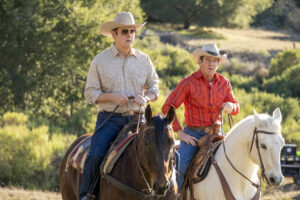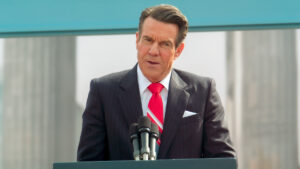Publication Date: 09-03-2024
Reagan (2024) review
Dir. Sean McNamara
By: Steve Pulaski
Rating: ★½
The debacle it took to get this iteration of Ronald Reagan’s life and presidency made was so riddled with financial obstacles that it’s a minor miracle that almost everyone, from actor Jon Voight (attached in 2012) to director Sean McNamara (committed in 2016), remained faithful to it over the course of 14 years. When a film languishes in purgatory for that long, it’s generally overstuffed with too many underdeveloped ideas, some of which attributable to multiple script rewrites.
That’s one of many problems with Reagan, the latest in the long-running line of biopics that fails its subject. Maybe Don McLean could write a song about 2024 being the year the biopic died, given the utterly lackluster movies we’ve gotten based on the lives of Bob Marley and Amy Winehouse. Don’t breathe a sigh of relief just yet. We still have one revolving around Bob Dylan before the year is up; my fingers remain crossed, albeit faithlessly.

Ronald Reagan’s longstanding lore in the eyes of the conservative populous is largely attributable to the way in which his successors, to this day, see his simplistic and broadly generalized view of American life as something even remotely replicable in present times. That’s because Reagan’s America worked for only a portion of the country. Dedicated to keeping crime off the street and relegating it to the White House, with 138 officials in his administration indicted, Reagan not only sat back and watched AIDS kill millions of Americans, he gut unions and reduced the power of the individual laborer, kickstarted a fruitless war on drugs, offered millions of minorities a prison cell as a consequence, and undid leaner taxes and more take-home pay for working Americans as the cherry on top.
Obviously, those who diligently worked for many years to make Reagan possible have no interest in an even-handed expose of their titular titan. This rose-colored glasses drama plays more like a tribute film than a serious work of cinema as it offers easily digestible moments that tell you how to feel and show you an intimate look at the process of mythmaking.
Howard Klausner’ script — working off of Paul Kengor’s book The Crusader: Ronald Reagan and the Fall of Communism — starts with John Hinckley’s assassination attempt on Reagan (Dennis Quaid) before setting up some seriously shoddy framework. While mostly chronological, the story is told from a retired KGB agent named Viktor Petrovich (lifelessly played by Jon Voight). Petrovich, a fictional composite of several KGB agents tasked with keeping tabs on the actor-turned-president, illustrates Reagan’s early life as a Hollywood B-movie actor, who then went on to be the SAG president, Governor of California, and of course, President of the United States.

Whether it’s combatting the “Red Scare” in Hollywood as SAG president, resurrecting America’s economy, or tearing down the Berlin Wall and ending the Soviet reign, Klausner makes it seem as if Reagan was single-handedly behind every notable world event. In order to be such a hagiographic work, this requires the omission of many other germane events and widespread oversimplifications of history. In that department, Reagan has you covered.
Between Voight’s thick-tongued Russian accent interminably narrating the picture, and its relentless hopscotching between time-periods, assuring no era nor occurrence gets adequate development, Reagan no less achieves the feat of feeling overstuffed. Its 135-minute runtime is merciless, especially when it makes pitstops to demonize college protestors and undercut Reagan’s campaigning for Barry Goldwater (coupled with their mutual opposition for Civil Rights). By the time we get to the meat of the film, involving rising Soviet tensions and the Iran-Contra affair, all focus that doesn’t revolve around Reagan being charismatic and tirelessly optimistic is lost.

One perk of Reagan is it’s run amok with cameos. C. Thomas Howell turns up as Caspar Weinberger in a two (?) blink-and-you-miss-them scenes; Mena Suvari plays Jane Wyman, the Gipper’s first wife, who spends the duration of her scenes neglected; Kevin Dillon as Jack L. Warner, and Creed’s Scott Stapp of all people as Frank Sinatra (miscast, but clearly having a lot of fun).
Reagan is a ludicrously hagiographic biography that serves as red meat for a large sector of people dying to relive the so-called good ol’ days in between political arguments on Facebook. For those who strive to be informed, it’s a shameless lesson in mythmaking. That’s why the 2020 miniseries on the Reagans exists. It may be too biasedly pessimistic at times, but it’s a lot more factual than what you’ll see dramatized here.
Starring: Dennis Quaid, Penelope Ann Miller, Jon Voight, Robert Davi, Nick Searcy, Kevin Dillon, Mena Suvari, C. Thomas Howell, Lesley-Anne Down, and Scott Stapp. Directed by: Sean McNamara.
About Steve Pulaski
Steve Pulaski has been reviewing movies since 2009 for a barrage of different outlets. He graduated North Central College in 2018 and currently works as an on-air radio personality. He also hosts a weekly movie podcast called "Sleepless with Steve," dedicated to film and the film industry, on his YouTube channel. In addition to writing, he's a die-hard Chicago Bears fan and has two cats, appropriately named Siskel and Ebert!


